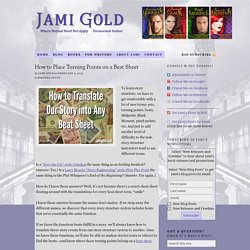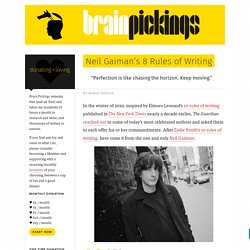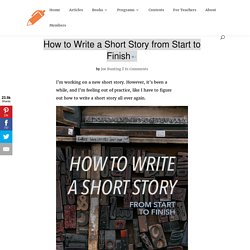

Story Grid: 6 Core Questions Introduction. How to Place Turning Points on a Beat Sheet. To learn story structure, we have to get comfortable with a lot of new terms: acts, turning points, beats, Midpoint, Black Moment, pinch points, etc.

And just to add another level of difficulty to the task, story structure instructors tend to use different terms. Is a “Save the Cat”-style Catalyst the same thing as an Inciting Incident? (Answer: Yes.) Is a Larry Brooks “Story Engineering”-style First Plot Point the same thing as the Plot Whisperer’s End of the Beginning? (Answer: Yes again.) How do I know those answers? I know those answers because the names don’t matter. How Not to Write a Novel: 7 Things That Will Doom Your Novel. There are a lot of ways not to do something.

Like the new boat owner a few years ago who was filling up his pleasure craft with fuel for that first time out. Only he mistook the tube meant to hold fishing poles for the gas tank. After completing his work he started up the engine. The gas fumes ignited and blew the boat owner into the sky. He came down in the drink and was rescued, but the boat was a goner. Ben Fountain - How to write about a war you never witnessed. 10 Elementary Tips For Writers From Sherlock Holmes. SourceSince Sherlock Holmes first appeared in 1887, the four novels and 56 stories featuring him have never been out of print.

He has become the most-played movie character in history, with 200 actors having played the role. Other writers have created memorable characters who solve mysteries with reason. But Arthur Conan Doyle's Sherlock Holmes is the detective who has truly captured the world's imagination. To celebrate the anniversary of Arthur Conan Doyle's birthday, I thought I would put together 10 things writers can learn from the world's most famous detective. Master your craft: Writers have to learn the rules before they break them.
Neil Gaiman’s 8 Rules of Writing. By Maria Popova In the winter of 2010, inspired by Elmore Leonard’s 10 rules of writing published in The New York Times nearly a decade earlier, The Guardian reached out to some of today’s most celebrated authors and asked them to each offer his or her commandments.

After Zadie Smith’s 10 rules of writing, here come 8 from the one and only Neil Gaiman: WritePut one word after another. Find the right word, put it down.Finish what you’re writing. Whatever you have to do to finish it, finish it.Put it aside. Writing Novels - 8 Things You Need to Know (From a Former Journalist) I’ve been a journalist for a long time.

I worked at newspapers, magazines and TV news stations. Now I write mystery novels about a fictional journalist, New York City newspaper reporter Gil Malloy. My old friends from the newsroom say to me: “Wow, you’ve got it easy these days. How to Write a Short Story from Start to Finish. I’m working on a new short story.

However, it’s been a while, and I’m feeling out of practice, like I have to figure out how to write a short story all over again. To some extent, the process for writing a story is different each time. In the introduction to American Gods, Neil Gaiman quotes Gene Wolfe, who told him, “You never learn how to write a novel. Writing Novels - 8 Things You Need to Know (From a Former Journalist)
Ten rules for writing fiction. Elmore Leonard: Using adverbs is a mortal sin 1 Never open a book with weather.

If it's only to create atmosphere, and not a character's reaction to the weather, you don't want to go on too long. The reader is apt to leaf ahead looking for people. There are exceptions. Ten rules for writing fiction(part two) Hilary Mantel 1 Are you serious about this?

Then get an accountant. 2 Read Becoming a Writer, by Dorothea Brande. Then do what it says, including the tasks you think are impossible. You will particularly hate the advice to write first thing in the morning, but if you can manage it, it might well be the best thing you ever do for yourself. 73 Ways to Become a Better Writer. Aerogramme Writers' StudioPixar's 22 Rules of Storytelling. These rules were originally tweeted by Emma Coats, Pixar’s Story Artist.

Number 9 on the list – When you’re stuck, make a list of what wouldn’t happen next – is a great one and can apply to writers in all genres. You admire a character for trying more than for their successes.You gotta keep in mind what’s interesting to you as an audience, not what’s fun to do as a writer. They can be very different.Trying for theme is important, but you won’t see what the story is actually about til you’re at the end of it. Now rewrite.Once upon a time there was ___. Every day, ___. 102 Resources For Fiction Writing. UPDATE 1/10: Dead links removed, new links added, as well as Revision and Tools and Software sections.

Bird by Bird: Anne Lamott’s Timeless Advice on Writing and Why Perfectionism Kills Creativity. By Maria Popova “Perfectionism is the voice of the oppressor, the enemy of the people. It will keep you cramped and insane your whole life.” Anne Lamott’s Bird by Bird: Some Instructions on Writing and Life (public library) is among my 10 favorite books on writing — a treasure trove of insight both practical and profound, timelessly revisitable and yielding deeper resonance each time. Lamott adds to the collected wisdom of great writers with equal parts candor and conviction, teaching us as much about writing as she does about creativity at large and, even beyond that, about being human and living a full life — because, after all, as Lamott notes in the beginning, writing is nothing more nor less than a sensemaking mechanism for life: One of the gifts of being a writer is that it gives you an excuse to do things, to go places and explore.
How to Write the Last 10% of Your Novel. There’s a stage of publishing that’s not often talked about. It’s the stage at which you’ve completed what you believe to be your final draft. Critique groups, writing instructors and published authors rave about your writing. You feel justified. Ready. How to Break the Rules of Writing (& More) According to Bestselling YA author Ransom Riggs. Like most first conversations and bad first drafts, my (WD’s Managing Editor Adrienne Crezo) interview with Ransom Riggs begins with a discussion about the weather. And not just any weather, either, but peculiar versions of standard precipitation: dust storms, cloudbursts, thundersnow and tornadoes.
Of course, Riggs is experiencing none of those phenomena as he sits in the warmth of the never-ending summer of Los Angeles. “I hate to tell you what it’s like here right now,” he says. “No, I don’t. 3 Tips for Writing Heavy Emotional Scenes. Yesterday, I tweeted a link to a great post by Sally Apokedak about not cheating the reader by skipping emotional scenes. Some writers struggle with heavy scenes. They’re uncomfortable with “invading” the privacy of their characters. They worry about creating laughably cheesy scenes. Or they think a scene that’s essential to the emotional journey is unnecessary because the reader already knows what will happen.
Short Stories: 10 Tips for Creative Writers. These Writing Tips From George R.R. Martin And Robin Hobb Are Just Epic. 22 rules of storytelling by pixar. How to Make Readers Feel Emotion. On January 30th, 2011 by Fiction Editor Beth Hill and last modified on February 8, 2011 I wrote an article on the importance of creating emotions in readers, but I’ve noticed that writers are looking for specifics on how to accomplish that.
So, this article complements that first one, presents practical tips on how to stir the reader’s emotions. Readers like to be touched, moved, by story. They like to imagine themselves in worlds and situations that challenge them, that give them opportunity to do and be something other than what they do or are in their real lives. Fiction, whether in book or film or games, allows people to not only step into other worlds, but to experience those worlds. The 22 rules of storytelling, according to Pixar. How to Write a Novel Readers Won’t Put Down. Take advantage of our Instructor of the Month deal and get all of James Scott Bell’s bestselling books on writing (and more) for one heavily discounted price.
Order Now >> 10 Writing Rules You Can't Break...And How to Break Them. Important Writing Lessons From First-Time Novelists. KIRA PEIKOFF (kirapeikoff.com) is the author of the acclaimed thriller Living Proof (Tor Books). 10 Dos & Don'ts For the Aspiring Novelist. Two months ago my first novel hit the bookstores. Dwight V Swain On How To Write A Novel. Time and again folks have recommended Dwight V. Short Stories: 10 Tips for Creative Writers. 10 Ridiculously Simple Tips for Writing a Book. 8 Things Star Wars Can Teach Us About Writing. 10 Things Shakespeare Can Teach Us About Writing Thrillers. Conspiracy. Murder. Politics. Kurt Vonnegut’s 8 Tips on How to Write a Great Story. Famous Advice on Writing: The Collected Wisdom of Great Writers.
By Maria Popova By popular demand, I’ve put together a periodically updated reading list of all the famous advice on writing presented here over the years, featuring words of wisdom from such masters of the craft as Kurt Vonnegut, Susan Sontag, Henry Miller, Stephen King, F. Scott Fitzgerald, Susan Orlean, Ernest Hemingway, Zadie Smith, and more. Dare to Disturb the Universe: Madeleine L’Engle on Creativity, Censorship, Writing, and the Duty of Children’s Books. By Maria Popova “We find what we are looking for. If we are looking for life and love and openness and growth, we are likely to find them. Six Tips on Writing from John Steinbeck. Six Strategies That Have Quickly Improved My Writing. Annie Dillard on Writing.
Joan Didion on Telling Stories, the Economy of Words, Starting Out as a Writer, and Facing Rejection. 15 Habits That Will Make You A Better Writer. Fifty Writing Tools: Quick List. The Writing Tools of 20 Famous Authors. Fifty (50!) Tools Which Can Help You in Writing. The Writers Helpers. AdviceToWriters - Advice to Writers. Creative Writing Help & Inspiration. Write What You Know, But What If You Don’t Know Enough? Reflection of the Mind : So I’ve seen a great number of people who aren’t... Lessons learned in a writing journey. This Itch of Writing: the blog. Writers Tip #71: How to Write a Novel. Pixar's 22 rules to phenomenal storytelling.